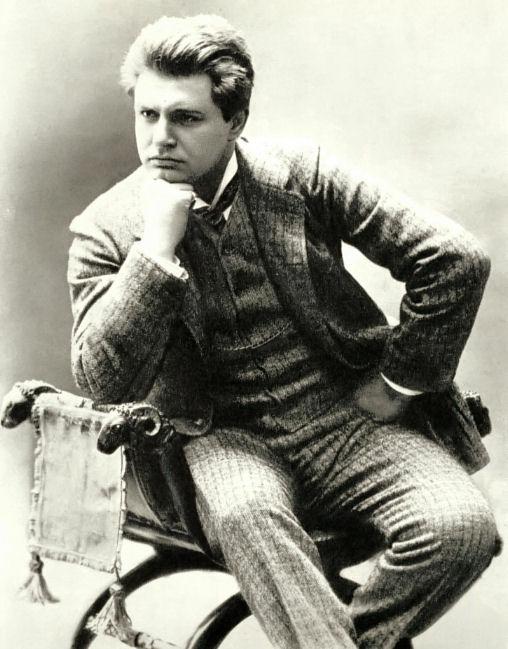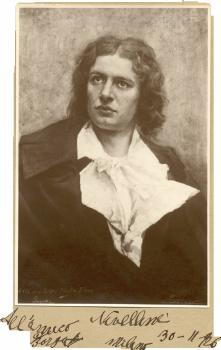Giuseppe Borgatti
Borgatti was a poor and reportedly even illiterate bricklayer when his voice was discovered by pure chance.
A local aristocrat payed for his studies, and already in 1892, he could make his debut as Gounod's Faust in Castelfranco
Veneto.
After a few years on various Italian stages, in Madrid and in St. Petersburg, he had the chance of stepping in for Alfonso
Garulli in the title role in the world premiere of Andrea Chénier at La
Scala (28 March 1896), and his enormous success made him a major operatic star. From now on, he would sing regularly at La
Scala, particularly in productions conducted by Toscanini, who admired him. Another place where he was very popular was Buenos
Aires, where he sang repeatedly from 1898 onwards; Rome and Bologna, too, were centers of his artistic activity.
He soon specialized in Wagner: he was Milano's first Young Siegfried (1899), and sang almost every Wagner lead tenor role
throughout Italy (La Scala, Bologna, Genova, Naples) as well as in Buenos Aires. Even Cosima Wagner was impressed by him, and
invited him to sing Young Siegfried in Bayreuth in 1904 (sources differ on whether it really came about or not; we'll know if
and when the 21st century arrives also in Bayreuth, and the Festival will put their historical casts online).
World premieres in which he participated, besides Andrea Chénier, were Tartini o Il trillo del diavolo by Stanislao
Falchi (Rome, 1899), Cassandra by Vittorio Gnecchi (Bologna, 1905) and Semirama by Ottorino Respighi (Bologna, 1910).
In the 1910s, his glaucoma worsened to the extent of rendering him almost blind, which made further stage appearances
impossible. He opened a famous singing school in Milano, and continued to sing in concert, even after completely losing
eyesight about ten years later; his last public appearance took place in 1928 in Bologna. Among Borgatti's pupils were Willi
Domgraf-Fassbaender and Heddle Nash.
Reference 1, reference 2: Kutsch &
Riemens
I wish to thank Ashot Arakelyan for the picture (top). I wish to thank Richard J Venezia for the recording (Cede il verno 1). Faust – Castelfranco Veneto, 17 September 1892 Fra Diavolo – Cotigola, 2 April 1893 Don Pasquale – Imola, 5 August 1893 Manon Lescaut – Novara, 21 December 1893 La favorite – Novara, 6 January 1894 Edmea – Novara, 26 January 1894 I dispetti amorosi – Torino, 27 February 1894 Falstaff – Firenze, 19 April 1894 Maruzza – Venezia, 23 August 1894 Lohengrin – Milano, 15 September 1894 La Gioconda – 10 November 1894 Lucia di Lammermoor – Madrid, 22 November 1894 Mefistofele – Padova, 18 June 1895 La traviata – St. Petersburg, 30 December 1895 Don Giovanni – St. Petersburg, 2 January 1896 Demon – St. Petersburg, 9 January 1896 Amleto – St. Petersburg, 24 January 1896 Andrea Chénier – Milano, 28 March 1896 Pagliacci – Cairo, 13 December 1897 Rigoletto – Buenos Aires, 19 June 1898 La bohème – Buenos Aires, 16 July 1898 Die Meistersinger von Nürnberg – Buenos Aires, 5 August 1898 Die Königin von Saba – 26 December 1898 Tartini o Il trillo del diavolo – Roma, 29 January 1899 Norma – Roma, 20 February 1899 Iris – Roma, 18 May 1899 Siegfried – Milano, 26 December 1899 Anton – Milano, 17 February 1900 Tosca – Milano, 20 December 1900 Tannhäuser – Buenos Aires, 21 May 1901 Medio evo latino – Buenos Aires, 21 July 1901 Chopin – Milano, 25 November 1901 Carmen – Alessandria, 18 December 1902 Proserpina – Alessandria, 3 January 1903 Fedora – Ferrara, 9 May 1903 Rheingold – Milano, 10 December 1903 Siberia – Genova, January 30 1903 La damnation de Faust – Buenos Aires, 7 July 1904 Der Freischütz – Buenos Aires, 6 August 1904 Werther – Lisboa, 16 February 1905 Manuel Menendez – Lisboa, 14 March 1905 Cassandra – Bologna, 5 December 1905 Salome – Milano, 26 December 1906 Götterdämmerung – Napoli, 8 December 1908 Venezia – Palermo, 27 February 1909 Semirama – Bologna, 20 November 1910 Parsifal – Bologna, 1 January 1914
Reference: Gualerzi/Orlandini/Battaglia/Roscioni/Rubboli Un dì all'azzurro spazio, Cassa di Risparmio di Cento. |

